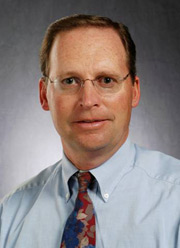
Most new therapists aspire to one day move up the management ladder. But not all of them will. What do managers look for when it comes time to fill a supervisory position? AARC member Rick Ford, BS, RRT, FAARC, respiratory care manager at the University of California San Diego Medical Center, shares his top priorities—
What do you look for when you get ready to either hire in a supervisor or promote from within?
Rick Ford: The most important characteristics in leading are respect and trust, so I look for those same qualities in peer relationships. If you’re an observant leader that engages your team and listens to what they have to say, you’re likely going to have a clear understanding of who others trust and respect. Additionally I look for who is a good teacher. Those individuals typically have the required advanced skills and ability to communicate effectively. Those that exhibit a positive energy about what they do, and can energize others, are on my “A” list for a leadership role.
What kinds of things should staff members be doing to look like “supervisory material” when a position opens up?
Rick Ford: Often a person becomes the “leader” of a team without being in a formal supervisor capacity. In some situations I have seen staff therapists better motivate, and influence behavior to a greater degree, than their supervisor! Those things that make a good leader have nothing to do with the supervisor title, but how the individual is viewed by others. This is a short list of things staff members can do:
- Develop exceptional expertise in technology and treatment and serve to teach others.
- Exceed work expectations in terms of attendance/accountability. Staff who have high rates of sick call, arrive late, cut out early, or simply are not accountable for assignments will find themselves left behind when it comes to leading.
- Step forward when department management is seeking volunteers for special projects; in fact, lead the project.
- Do what you say, and say what you mean.
- Manage up at every opportunity; be the advocate for your peers and department.
What kinds of behaviors would make you automatically NOT consider an existing employee or a new applicant for such a position?
Rick Ford: Even if staff have exceptional clinical skills, or an advanced degree that may better qualify them for leadership, if they fail to treat others in a way that is helpful and supportive, they are off my list of candidates.
Can existing staff members with these negative behaviors ever recover and at some point become “supervisory material” in your eyes?
Rick Ford: It can take years to truly develop a high sense of trust and respect among staff, and a single moment in time to lose all of it. I have seen staff recover and succeed, but it is a humbling experience they need to be willing to endure. I have often advised leaders that have had a setback to win back trust one therapist at a time. They have to acknowledge where they went wrong, seek input from staff on how they can improve, make the commitment to make needed changes, and work to exceed the expectations of others.
You alluded to the importance of staff opinions in leadership selection several times. How are your staff involved?
Rick Ford: Every leader is selected by staff. So it is the staff that is the most important member of our interview team. Job candidates have to impress their peers, as they are the ones that select our next leaders. We also have a group called Partners in Leaders in which each supervisor is teamed up with one or more staff therapists. The staff partner serves to review department issues and attend Partner meetings where important department decisions are made, largely by staff. When seeking new leaders, we look for those that participate in the Partners in Leaders program. They start to participate, lead, and influence in a very public way before they lead in a formal capacity.
What else do you look for in folks who seek out supervisory positions?
Rick Ford: In developing new leaders, I am also looking for those with a willingness to be increasingly engaged in self-improvement. Those improvement efforts can range from leadership classes inclusive of the management track in the AARC Leadership Institute to reading the works of expert authors, in which case the AARC Leadership Book Club is an option. I also advise struggling leaders to find a mentor, to find a leader that is exceptional and seek their advice…and then do what they do.
